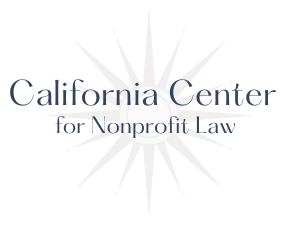
2024 Online Fundraising Update: California Attorney General Finalizes Regulations
Assembly Bill 488 (“the law”), which regulates online charitable fundraising platforms and platform charities and places them under the control of the California Attorney General, went into effect on January 1, 2023. Since then, the Attorney General has released three drafts of proposed regulations implementing the new law, with the most recent draft issued in November 2023. Finally, the rulemaking process is complete, and on March 26, 2024, the Office of Administrative Law approved the latest draft of the regulations and filed them with the Secretary of State.
Assembly Bill 488 (“the law”), which regulates online charitable fundraising platforms and platform charities and places them under the control of the California Attorney General, went into effect on January 1, 2023. Since then, the Attorney General has released three drafts of proposed regulations implementing the new law, with the most recent draft issued in November 2023. Finally, the rulemaking process is complete, and on March 26, 2024, the Office of Administrative Law approved the latest draft of the regulations and filed them with the Secretary of State. While most of the regulations went into effect on that same date, some of the regulations will not become effective until June 12, 2024, and January 1, 2025. The California Center for Nonprofit Law is here to ensure that you are aware of any updates affecting your nonprofit organization. We will advise you of any measures you must take and help you implement them to remain compliant. Contact us today at (949) 892-1221 and see how we can help.
Applicability of the Law
The law applies to charitable fundraising platforms and platform charities. A charitable fundraising platform is any person or legal entity that uses the Internet to provide a website, service, or a platform to people in California and “performs, permits, or otherwise enables acts of solicitation to occur.” A platform charity is a charitable organization that facilitates acts of solicitation on a charitable fundraising platform, either by soliciting donations on a charitable fundraising platform for a charitable organization or by granting funds to charitable organizations based on purchases made or activities performed by persons using a charitable fundraising platform. The new regulations define “platform” as a “website, mobile device application, computer software application, or other internet-based interactive electronic medium.”
Educational institutions and government entities, as well as their subdivisions and agencies, are exempt from this law.
Defining Types of Solicitation Activities
The new regulations classify different types of solicitation activities, which affect various aspects of online charitable fundraising operations, including the requirement to complete various obligations and the types of disclosures required by the law. The types of solicitation activities are as follows:
· Type A – soliciting donations or recommended donations, such as micro donations, round up donations, or donations of any amount, from platform users by listing or referencing one or more charitable organizations to receive donated funds;
· Type B – permitting or enabling crowdfunding campaigns created by platform users engaging in peer-to-peer charitable fundraising or otherwise permitting or enabling platform users to solicit donations or recommended donations made by other platform users for one or more charitable organizations;
· Type C – performing solicitations through charitable sales promotions, coventuring or cause marketing campaigns, or free action programs in which platform users can select one or more charitable organizations to receive donated funds based on the purchases made or other activity performed by platform users;
· Type D – performing solicitations in the same manner as Type C solicitations, except the charitable fundraising platform selects one or more charitable organizations to be sent donated funds based on the purchases made or other activity performed by platform users;
· Type E – providing a customizable charitable fundraising platform to charitable organizations subject to a software-as-a-service license agreement and allowing charitable organizations to solicit donations.
Registration and Filing Requirements
All entities subject to the law must initially register with the Attorney General’s Registry of Charities and Fundraisers using an initial registration form provided by that office and submit required supporting materials, along with a $50 registration fee. However, the required materials for initial registration differ for commercial fundraisers for charitable purposes, fundraising counsels for charitable purposes, commercial coventurers (see Section 313 of the regulations), and charitable fundraising platforms (see Section 315 of the regulations, effective June 12, 2024).
All entities subject to the law must file periodic written reports with the Registry, including an Annual Registration Renewal Fee Report and a renewal fee, which varies based on the registrant’s total revenue for the previous fiscal year. Entities also must annually file Internal Revenue Service Form 990, 990-PF, 990-EZ, or 1120, together with all attachments and schedules as applicable, in the same form as filed with the Internal Revenue Service, except for Schedule B to Form 990. Some registrants have additional reporting requirements if their revenue falls below the threshold for filing Form 990-EZ or if they are not exempt from federal taxation.
Again, the reporting requirements differ for commercial fundraisers for charitable purposes, fundraising counsels for charitable purposes, commercial coventurers (see Section 313 of the regulations), and charitable fundraising platforms (see Section 315 of the regulations, effective June 12, 2024).
Other Requirements of the Law
The law requires charitable fundraising platforms and platform charities to meet other requirements to remain compliant with the law, as follows:
· Ensure that all participating charities are in good standing with the Internal Revenue Service, the Franchise Board, and the Attorney General, which includes the duty to check the Attorney General’s regularly published “May Not Operate or Solicit for Charitable Purposes” list;
· Make certain disclosures to donors before the donor can finalize a donation or select a charitable recipient organization based on the type of solicitation activities involved (see Section 318 of the regulations, effective January 1, 2025);
· Obtain written consent from charities to include them on the platform, which includes a required fee disclosure of the total amount of fees charged by each platform;
· Holding donated assets separately from other donated funds;
· Send tax donation receipts to donors within five business days of the date that a donation is made if engaging in solicitation types A or B (see Section 319 of the regulations, effective January 1, 2025);
· Promptly send donations or grants of recommended donations to recipient charitable organizations according to differing rules, depending on the type of solicitation involved (see Section 320 of the regulations, effective January 1, 2025);
· Provide certain information regarding donations or grants of recommended donations to recipient charitable organizations, which differs according to the type of solicitation involved (see Section 321 of the regulations, effective January 1, 2025);
· Provide an ability for donors and/or platform users to find out whether their donations or grants of recommended donations or engaged in purchases or activities that caused donations, were sent to recipient charitable organizations if they choose (see Section 321 of the regulations, effective January 1, 2025);
· Send donated funds to charitable organizations within ten business days of receipt when those engaging in peer-to-peer charitable fundraising are sent
donated funds from a charitable fundraising platform or platform charity that engages in solicitation type B;
The remainder of the regulations focus on the means of giving notice to the Attorney General, as well as the consequences of failing to comply with the law.
Allow Us to Meet Your Legal Needs
The California Center for Nonprofit Law dedicates its efforts to the daily legal matters that charities face, including ongoing compliance with changes in the law. Call us today at (949) 892-1221 and schedule a time to discuss your case. Get your questions answered and learn more about how we can help.
